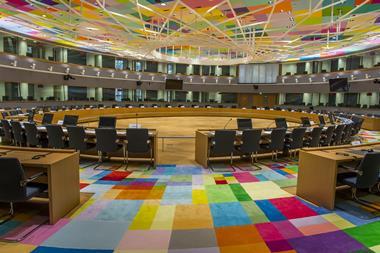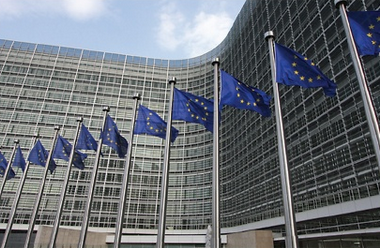The EU taxonomy climate delegated act will be applicable from 1 January 2022 after the EU Council’s extended scrutiny period expired without official objections from the forum.
Adopted by the European Commission in April, the rules in question include the technical criteria for screening economic activities for their contribution to climate change mitigation and adaptation. The legislation was already cleared by the European Parliament in October.
For political reasons, the delegated act leaves out criteria for natural gas and nuclear energy, with the Commission having said it is aiming to come forward with a proposal for these sectors by the end of the year. According to a report from Bloomberg, this could happen on 22 December, following a meeting of EU heads of government on 16 December.
IPE understands that the taxonomy is not on the agenda of that meeting itself, but that on previous occasions it came up in the context of discussions about energy prices, which are also scheduled for the meeting on 16 December.
The taxonomy climate delegated act’s entering into force means that corporates, and certain financial institutions, will be able to start using the criteria to report on the taxonomy alignment of their activities, although they are only required to do so from January 2023. Their obligation from January 2022 is for reporting on the taxonomy eligibility of their activities.
This timeline is not aligned with that for disclosure obligations for pension funds and other investors, however. These are supposed to report from January 2022 on the taxonomy alignment of their plans and products if these make sustainable investments with environmental objectives and are promoted as such.
In addition, following another delay, the detailed rules for these disclosures, including templates, won’t apply until January 2023. According to Emma Bickerstaffe, director, ESG and sustainability at MJ Hudson, the delay means that until January 2023 financial market participants can present the requested information in “free format”.
At an EIOPA roundtable on Tuesday, Ursula Bordas, senior expert on consumer protection in pensions at the supervisor, said any reporting on taxonomy-alignment from next year should be quantitative and not use estimates.
She also appeared to suggest that financial market participants could deal with the temporary misalignment between the various rules by not marketing their product as taxonomy-aligned even if it made taxonomy-aligned investments.
Bordas also announced that EIOPA and its fellow European supervisors would be updating a supervisory statement on the sustainable finance disclosure regulation (SFDR) to clarify taxonomy-related product disclosure obligations in the absence of the underlying implementation rules being effective.
She also said the supervisors would publish Q&As on the application of the SFDR and would send a list of questions to the Commission that required interpretation of the taxonomy regulation and the SFDR.
‘Keep it clean’ please
Investor groups welcomed the news of the first taxonomy climate delegated act becoming official while also emphasising the importance of basing the forthcoming decisions about nuclear energy and natural gas on the best available scientific evidence.
“Any proposal from the European Commission should consider investors’ need for objective criteria,” said Fiona Reynolds, PRI’s outgoing CEO. “Recognising activities that have a role in the transition, for example via an extension of the EU sustainable taxonomy, should be prioritised by EU policymakers.”
In the Netherlands, the pension fund association earlier this week published a paper about the need to keep the EU taxonomy science-based. It called for all those involved in the EU taxonomy legislative process to consider the introduction of an intermediate, transitional category in the taxonomy.
It said that only when the taxonomy was based on rigorous scientifically-based pathways and thresholds acknowledged by a wide range of experts would it “maintain credibility, mobilise private capital and build the necessary trust with citizens, investors and companies”.
“Trust that is urgently needed to catalyse the flow of private capital to projects that significantly contribute to the goals set in Glasgow and the European Green Deal.”
The Climate Bonds Initiative said that the incorporation in the taxonomy delegated act of many thresholds recommended by the Commission’s technical expert group (TEG) on sustainable finance “have ensured the taxonomy is seen as a credible and scientific assessment of economic activities’ Paris alignment”.
It said maintenance of the 100g CO2e/kWh declining threshold for electricity generation was important for the continued scientific credibility of the EU taxonomy, echoing comments made by Andreas Hoepner, a member of the TEG’s successor, the Platform on Sustainable Finance.
Eurosif welcomed the official publication of the first set of criteria for providing much needed clarity to companies and investors.
Executive director Victor van Hoorn said the content of the taxonomy delegated act was not perfect, with re-evaluation of the technical screening criteria for some sectors needed, but that “at this stage, let’s ensure perfect is not the enemy of the good, and we start operationalising the frameworks”.
In a separate note, the responsible investment association said including natural gas and nuclear energy in the EU taxonomy framework, even in a transitional activity category, would necessitate modifications to the reporting rules under the SFDR to safeguard transparency and avoid misselling.
Next year proposals are due from the Commission on technical screening criteria for the other environmental objectives covered by the taxonomy regulation. Its advisory body has already consulted on preliminary recommendations for these.
This article was updated after publication to include mention of the European supervisory authorities’ plans to update a statement about the implementation of the SFDR, publish Q&As and send questions to the Commission
Looking for IPE’s latest magazine? Read the digital edition here.








